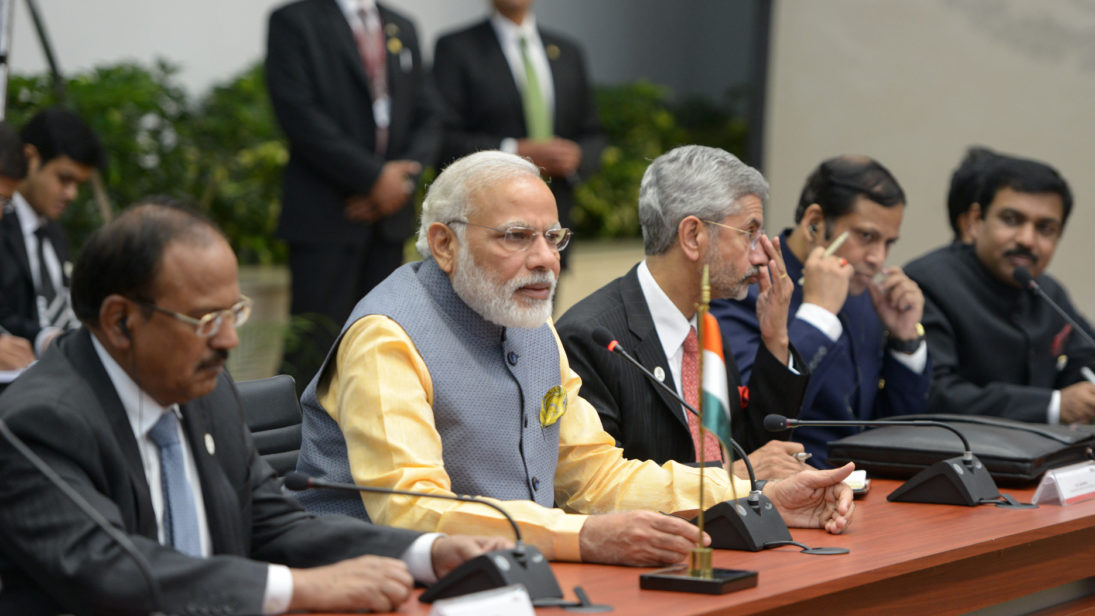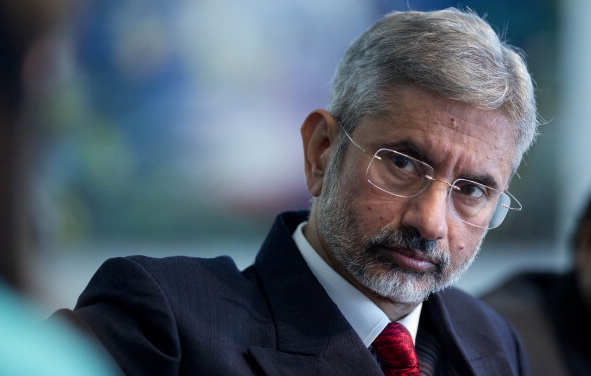
In most democracies, foreign policy tends to stay the course despite partisan changes in leadership. In India’s case, such continuities are visible across time and through different governments. For instance, India’s attempt to find a permanent seat at the UN Security Council since the early 1990s, its leadership of the developing world in trade negotiations at the WTO, and its refusal to join the Nonproliferation Treaty and the Comprehensive Test Ban Treaty have all remained consistent foreign policy positions despite changes in regime.
Similarly, we should expect more continuity than divergence in Indian foreign policy under the new Narendra Modi government. This is the result of two main drivers of foreign policy in this government, both of which are symbolic of institutional continuity. The first is the new, technocratic Minister of External Affairs Dr. S. Jaishankar, an erstwhile career diplomat and foreign secretary in Modi’s previous term. And the second is the Neighborhood First policy, which was a cornerstone of Modi 1.0 and built on the previous Congress-led United Progressive Alliance government’s attempts to engage countries around India.
Technocratic Policymaker
Jaishankar was an important driver of some of Modi’s key first-term foreign policies and as foreign minister, he can ensure the continuity of those policies. In one of his most popular moves, Jaishankar led the rebranding of the “Look East” policy to the “Act East” policy, indicating a desire to inject new blood into strengthening India’s relationships with its eastern neighbors. While this was not a completely new policy, it was the logical next step from India’s historical efforts to engage Southeast Asia, especially post liberalization in 1991. With Jaishankar at the helm of foreign affairs, the new government is likely to continue emphasizing such policies initiated during his tenure as foreign secretary.
Though Jaishankar is not the first career diplomat to be India’s foreign minister, by putting a technocrat with no background in national politics in charge of one of the “top four” ministries—a position normally awarded to high-profile politicians—Modi is indicating that he values in-depth policy expertise.
Process-wise, a major expectation is that the newly-formed Indian government will embody more functional diplomacy, with the new foreign minister’s bureaucratic know-how and prior institutional knowledge aiding him in successfully steering India’s foreign policy. The contrast between former Minister of External Affairs Sushma Swaraj, a veteran politician, and Jaishankar, an experienced diplomat, is sharp. Though Jaishankar is not the first career diplomat to be India’s foreign minister, by putting a technocrat with no background in national politics in charge of one of the “top four” ministries—a position normally awarded to high-profile politicians—Modi is indicating that he values in-depth policy expertise, and trying to cement his image as a prime minister who gets things done.
Neighborhood First: Act East, Pakistan, and the Indo-Pacific
Despite initiating a Neighborhood First Policy in his first term, which presented India as a partner willing to do business with its neighbors before all else, Modi was not able to overcome some serious challenges. One line of criticism is that despite ramping up its diplomatic engagement, India has not necessarily managed to increase its political options in its neighborhood. It is also important to note that Modi is not the first prime minister to make such an attempt at fixing India’s image in its neighborhood, with I.K. Gujral’s “Gujral Doctrine” being the most well-known predecessor.
Jaishankar willhave to take the criticism of this policy head on as he shapes India’s foreign engagementover the next five years. This will likely manifest itself in three spheres ofoperation. The first is the Bay of Bengal Initiative for Multi-SectoralTechnical and Economic Cooperation (BIMSTEC), the second is Pakistan, and thethird, and perhaps the trickiest, is the Indo-Pacific.
It is clear from his first foreign trip as foreign minister to Bhutan that the Neighborhood First Policy is foremost on Jaishankar’s agenda. However, the way India conceives of its neighborhood is now changing. Given that the 2019 general elections were preceded by hostilities with Pakistan, Modi 2.0 cannot backtrack on its hardline position of isolating Pakistan until the country addresses the problem of terrorist bases on its soil. However, this strategy of isolating Pakistan now poses a major obstacle to India’s Neighborhood First Policy, leading the Modi government to strategically re-draw the boundaries of its neighborhood and build its relationship with BIMSTEC, a regional grouping that excludes Pakistan. India’s Act East Policy also benefits from this reorientation since BIMSTEC members include Myanmar and Thailand. This Neighborhood First Policy is likely to continue to be the focus as it was spearheaded by Jaishankar when he was foreign secretary, having stated in the past that India needs to expand its understanding of its neighborhood to include the Middle East and Southeast Asia.1
The waxing and waning of India’s relationship with Pakistan surprises no one as it is part of a larger cyclical pattern of attempts at better relations and repeated failure to achieve this goal. During Prime Minister Modi’s first term, there was an initial effort to create goodwill. As a consequence, then Pakistani Prime Minister Nawaz Sharif attended the Indian government’s swearing-in ceremony and Modi visited Pakistan in 2015. However, despite the early momentum, there was deliberate inaction on this front from the Indian government for the next few years based on concerns of crossborder terrorism emanating from Pakistan. Matters came to a head earlier this year with the Pulwama terror attack in Kashmir, the subsequent Indian airstrikes in Balakot, and the air battle between India and Pakistan’s air forces that followed. Going forward, the onus will be on the new Indian government to de-escalate tensions with Pakistan first and then resume dialogue. To do this, New Delhi needs to muster the political will to recategorize Pakistan as an external affairs issue rather than treat it as a domestic politics issue.
Having previously served as ambassador to both China and the United States, Jaishankar is uniquely positioned to understand both sides and formulate an even approach that works for India. Ultimately, as Jaishankar has stated before, India will not look to balance or bandwagon, but instead serve its own national interest.
The Indo-Pacific is perhaps the most delicate of the new government’s foreign policy challenges because it involves India’s relations with both China and the United States. Both the Neighborhood First and Act East policies are strategies to balance China’s presence in India’s neighborhood. In fact, the United States views India as a central partner to offset growing Chinese assertiveness in the Indian Ocean region. However, the 2018 Wuhan summit displayed India’s willingness to constructively engage with China on issues of trade and investments as well as the boundary issue that continues to plague the two states. In addition, despite Washington and New Delhi’s common objectives vis a vis China, their relationship has experienced considerable roadblocks recently. Having previously served as ambassador to both China and the United States, Jaishankar is uniquely positioned to understand both sides and formulate an even approach that works for India. Ultimately, as Jaishankar has stated before, India will not look to balance or bandwagon, but instead serve its own national interest, which, among other things, involves ensuring no interference from China in its sphere of influence (particularly in Sri Lanka and the Maldives) and ensuring free trade and maritime operations in the region without Chinese interference.
Conclusion
Modi’s appointment of Jaishankar kills two birds with one stone. A recently retired successful career diplomat with high domain knowledge inspires both public and elite faith in the execution of India’s foreign policy, regardless of partisan preferences. Additionally, Modi avoided putting a powerful political figure in an important office who could have potentially challenged his foreign policy vision and can now implement a comprehensive strategy. However, the path ahead is fraught with obstacles. If the Neighborhood First policy of the Modi government is to succeed, it will have to tackle the challenges posed by Pakistan and the struggle for power in the Indo-Pacific. Backchannel diplomacy with Pakistan is not likely to incur the public’s wrath and could instead pave the way for normalizing the atmosphere in India’s immediate neighborhood. This can be achieved concurrently with India’s focus eastwards. In fact, continuous and explicit engagement with the rest of its neighborhood is essential for India’s interests, particularly if it wants to play a strong role in the dynamics of the Indo-Pacific.
***
Image 1: Presidencia de la República Mexicana via Wikimedia
Image 2: Bloomberg via Getty


